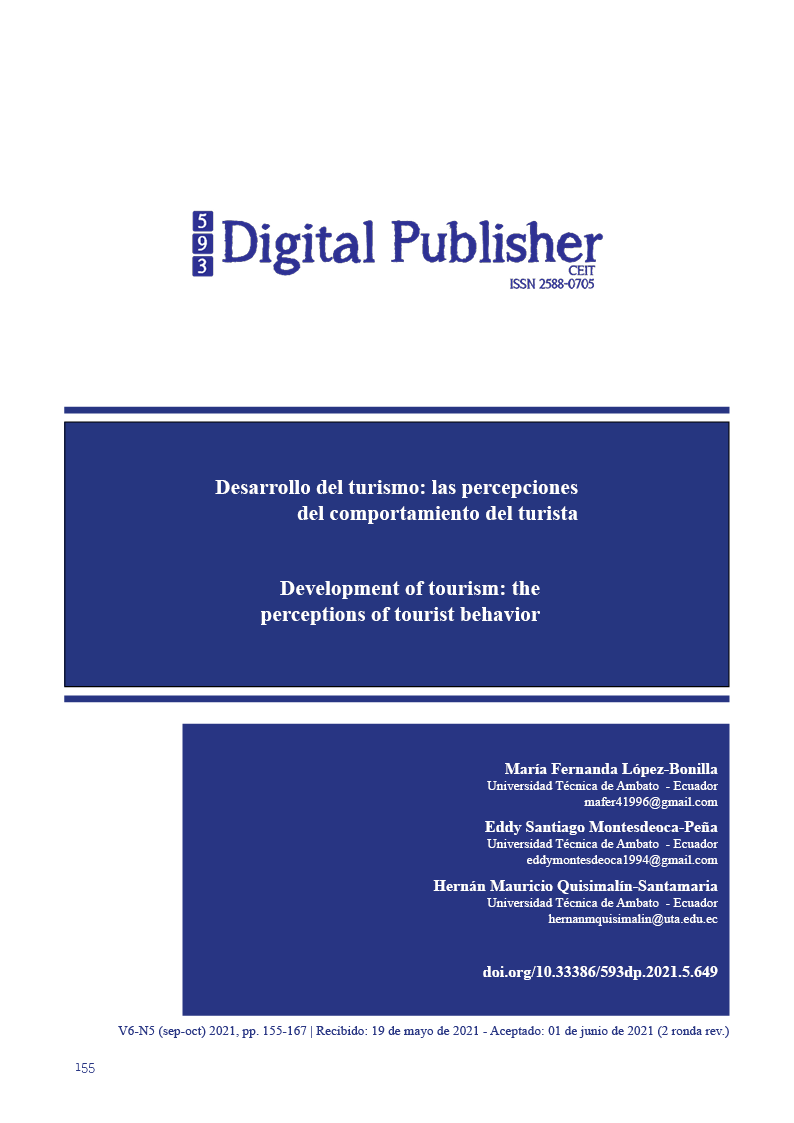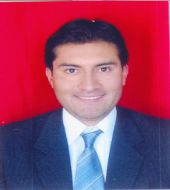Development of tourism: the perceptions of tourist behavior
Main Article Content
Abstract
The tourism sector has now undergone changes from the COVID-19 outbreak, its impact is negative and as a result the development of tourism has been affected by the closure of borders and the low influx of tourists, resulting in losses for the national-local economy. The objective of the research is to know how the perspective, behavior, motivations and attitudes of the tourist is when making the decision to travel in the face of the current health situation. The research was carried out in the province of Tungurahua, where information regarding the development, behavior, perceptions and resilience of the visitor to tourist destinations was collected, analyzed and synchronized under the new biosecurity regulations implemented worldwide.
Downloads
Article Details

This work is licensed under a Creative Commons Attribution-NonCommercial-ShareAlike 4.0 International License.
1. Derechos de autor
Las obras que se publican en 593 Digital Publisher CEIT están sujetas a los siguientes términos:
1.1. 593 Digital Publisher CEIT, conserva los derechos patrimoniales (copyright) de las obras publicadas, favorece y permite la reutilización de las mismas bajo la licencia Licencia Creative Commons 4.0 de Reconocimiento-NoComercial-CompartirIgual 4.0, por lo cual se pueden copiar, usar, difundir, transmitir y exponer públicamente, siempre que:
1.1.a. Se cite la autoría y fuente original de su publicación (revista, editorial, URL).
1.1.b. No se usen para fines comerciales u onerosos.
1.1.c. Se mencione la existencia y especificaciones de esta licencia de uso.
References
Academic Rigor. (2020). PIB. Obtenido de https://theconversation.com/turismo-en-tiempos-de-COVID-19-de-la-masificacion-al-distanciamiento-social-137567
Ajzen, I. (1991). The theory of planned behavior. 50(2), 179-211.
Aldefer, C. (1969). An Empirical Test of a New Theory of Human Needs. 142-175. doi:https://doi.org/10.1016/0030-5073(69)90004-X
Banco Central del Ecuador. (30 de Septiembre de 2020). Banco Central del Ecuador. Obtenido de https://www.bce.fin.ec/index.php/boletines-de-prensa-archivo/item/1383-la-economia-ecuatoriana-decrecio-12-4-en-el-segundo-trimestre-de-2020
Brill, T., Maillet, A., & Mayaux, P. (2017). PROCESS TRACING. INDUCCIÓN, DEDUCCIÓN E INFERENCIA CAUSAL. Scielo, 37(3), 659-684.
Cadena , P., Rendón, R., Aguilar, J., Salinas, E., De la Cruz , F., & Sangerman, D. (2017). Métodos cuantitativos, métodos cualitativos o su combinación en la investigación: un acercamiento en las ciencias sociales. Redalyc, 8, 1603-1617.
Calderón , F. (2020). El Ordenamiento Territorial y Desarrollo Turístico en la provincia de Tungurahua. 48-49-50.
Capitán, H. (1988). Desarrollo económico. Madrid: Alianza.
Cardenas Gomez, G. E., & Michel Nava, R. M. (2018). Descripocion de las teorias del desarrollo economico y desigualdad.
Cohen, S., Prayag, G., & Moital, M. (2014). Current Issues in Tourism. 17(10), 872-909. doi:http://dx.doi.org/10.1080/13683500.2013.850064
Crespo, J. A., & Soria, B. W. (2019). Factores que influyen en el comportamiento del turista: estado de la cuestión. Kalpana(17), 120-136. doi:1390-5775 ISSN-e: 2661-6696
Crompton, J. (1979). Motivations for pleasure vacation. 4, 408-424.
Dann, G. (1977). ANOMIE, EGO-ENHANCEMENT AND TOURISM. ANNALS OF TOURISM RESEARCH, 4(4).
Figuerola, M. (1990). Desarrollo y Turismo. Madrid.
Furtado, C. (2001). Revista Comercio Exterior, 51(2). Obtenido de http://revistas.bancomext.gob.mx/rce/sp/articleReader.jsp?id=6&idRevista=39
Furtado, C. (Febrero de 2001). CelsoFurtado y el problema del desarrollo. Revista Comercio Exterior, 51(2).
Garrido , G., & Gonzáles, G. (1 de Agosto de 2020). ¿La pandemia de COVID-19 y las medidas de confinamiento aumentan el riesgo de violencia hacia niños/as y adolescentes? Scielo, 91(4). doi:http://dx.doi.org/10.31134/ap.91.4.1
Hidalgo, C. (1988). Desarrollo económico. Madrid: Alianza.
Iso-Ahola, S. (1982). Toward A Social Psychological Theory of Tourism Motivation: A Rejoinder .
Jimenez, L. (1997). Desarrollo sostenible y ec onomía ecológica. Madrid: Sintesis.
Kirillova, K., Lehto, X., & Cai, L. (2016). Tourism and Existential Transformation:. 1-13. doi:https://doi.org/10.1177/0047287516650277
López, R., Cruz, F., Medina, S., Rivera, M., & Fernando, F. (enero-junio de 2016). DESARROLLO TERRITORIAL: UNA PROPUESTA DE VALOR PARA EL DESARROLLO DE CAPACIDADES DEL CAPITAL HUMANO EN EL DISTRITO DE DESARROLLO RURAL. Revista Mexicana de Agronegocios, 38, 241-252. Obtenido de https://www.redalyc.org/pdf/141/14146082003.pdf
Marquez, C., Asad, M., & Lengler, J. (Diciembre de 2018). A multinational comparative study highlighting students’ travel motivations and touristic trends. Journal of Destination Marketing & Management, 10, 87-100. doi:https://doi.org/10.1016/j.jdmm.2018.06.002
Martínez, J. A. (2011). FACTORES QUE INFLUYEN EN EL COMPORTAMIENTO DE COMPRA DEL TURISTA. 4(9).
Maslow , A. (1943). Una teoría de la motivacion Humana. Revisión psicológica, 50, 370-396.
McClelland, D. (1961). The achieving society.
Ministerio de Turismo . (2017). Boletín de estadisticas Turisticas. Obtenido de https://servicios.turismo.gob.ec/descargas/Turismo-cifras/AnuarioEstadistico/Boletin-Estadisticas-Turisticas-2011-2015.pdf
MINTUR. (2020). Indicadores Turisticos.
Monge, J. G., & Perales, R. M. (2015). El Desarrollo Turístico Sostenible - Tren Crucero del Ecuador. Redalyc, 5-6-7.
Moral, S., Orgaz, F., Cañero, P., & Jimber, J. A. (2017). ANÁLISIS DE LA MOTIVACIÓN Y EDAD DEL TURISTA Y SU SATISFACCIÓN EN DESTINOS FRONTERIZOS: EL CASO DE LA FRONTERA NORTE DOMINICO-HAITIANA. International Journal of Scientific Management and Tourism, 3(4), 431-445.
Moreno, O. (1971). El turismo como factor político en las relaciones internacionales. Mexico: Foro internacional.
OMS. (23 de noviembre de 2020). Organización Mundial de la Salud. Obtenido de Consejos para la población acerca de los rumores sobre el nuevo coronavirus (2019-nCoV): https://www.who.int/es/emergencies/diseases/novel-coronavirus-2019/advice-for-public/myth-busters
OMT. (31 de enero de 2020). DECLARACIÓN DE LA OMT SOBRE EL BROTE DEL NUEVO CORONAVIRUS. Obtenido de https://www.unwto.org/es/declaracion-de-la-omt-sobre-el-brote-del-nuevo-coronavirus
ONU. (Agosto de 2020). World Tourism Organization. Obtenido de Informe de políticas: La COVID-19 y la transformación del turismo: https://www.un.org/sites/un2.un.org/files/policy_brief_COVID-19_and_transforming_tourism_spanish.pdf
Orozco , J., & Núñez , P. (2013). Las teorías del desarrollo: En el análisis del turismo sustentable. 14(27), 143-167. Obtenido de https://www.scielo.sa.cr/pdf/is/v14n27/a08v14n27.pdf
Pearce, P. (1988). The Ulysses Factor: Evaluating Visitors in Tourist Settings. New York. doi:10.1007/978-1-4612-3924-6
Pearce, P., & Lee, U.-l. (2005). Journal of Travel Research, 226-237. doi:DOI: 10.1177/0047287504272020
Pereira , G., & Gosling, M. (2017). LOS VIAJEROS Y SUS MOTIVACIONES Un estudio exploratorio sobre quienes aman viajar. 26(1), 62-85. Obtenido de https://www.redalyc.org/pdf/1807/180749182004.pdf
Pérez, S. (septiembre-diciembre de 2010). El valor estratégico del turismo rural como alternativa sostenible de desarrollo territorial rural. 28(3), 507-513. Obtenido de https://www.redalyc.org/pdf/1803/180320698018.pdf
Plandetur. (26 de Septiembre de 2020). DISEÑO DEL PLAN ESTRATÉGICO DE DESARROLLO. Obtenido de Tourism&Leisure: https://www.turismo.gob.ec/wp-content/uploads/downloads/2013/02/PLANDETUR-2020.pdf
Possebon, J., Cervi, C., & Baggio, D. K. (2019). FACTORES QUE INFLUYEN EN LA DECISIÓN DE COMPRA DE VIAJES TURÍSTICOS. 28, 903-922.
Quintero, J. L. (2008). Turismo y desarrollo local en México El caso del municipio de Cabo Corrientes en Jalisco. Universidad de Guadalajara, Universidad Complutense Madrid.
Rodriguez Mateos, J. C. (2017). Teorias del Desarrollo.
Sampedro, J. (1980). Desarrollo social-económico del turismo. Barcelona.
Sinamanca, M., Hernández, R., & Padrón, N. (julio de 2020). Turismo pos-COVID-19 reflexiones, retos y oportunidades. doi:https://doi.org/10.25145/b.Turismopos-COVID-19.2020
Soldatenko, D., & Backer, E. (2019). A content analysis of cross-cultural motivational studies in tourism relating to nationalities. Journal of Hospitality and Tourism Management, 38, 122-139. doi:https://doi.org/10.1016/j.jhtm.2018.12.004
Vaca, C. A. (2016). PERFIL SOCIODEMOGRÁFICO Y ANÁLISIS DEL COMPORTAMIENTO DEL TURISTA NACIONAL QUE VISITA EL DISTRITO METROPOLITANO DE QUITO. Quito-Ecuador .
Vázquez, A. (2007). Desarrollo endógeno Teorías y políticas de desarrollo territorial.
Velásquez , P. (2011). Fomento turístico provincial: diagnóstico competencial, experiencias exitosas y propuesta de fortalecimiento institucional. Quito-Ecuador. Obtenido de http://www.congope.gob.ec/wp-content/uploads/2014/08/Fomento-Turistico-Provincial.pdf
Vidion , E., & Rickly, J. (2018). Alienation and anxiety in tourism motivation. Annals of Tourism Research, 65-75. doi:https://doi.org/10.1016/j.annals.2018.02.001
WWTC. (2020). WTTC revela consejos de viaje responsables para contrarrestar el brote de coronavirus. 11 de marzo de 2020. Obtenido de World Travel & Tourism Council: https://www.wttc.org/about/media-centre/press-releases/press-releases/2020/wttc-reveals-responsible-travel-tips-to-counter-the-coronavirus-outbreak




